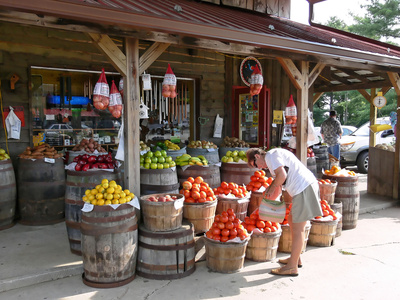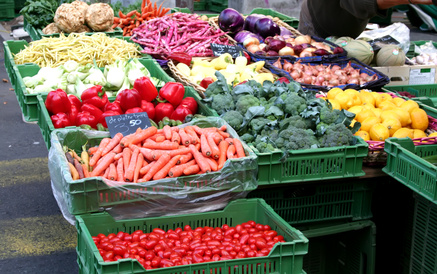
by Ashyia Hill
A couple of servings of vegetables or fruit should be the bare minimum for a healthy diet. The various vitamins and minerals you get from fresh produce helps you stay in good physical shape. Also, fruits and vegetables are rich in fiber – something that a multivitamin can’t quite give.
With all the benefits people get from consuming produce, it’s a shame that most don’t eat enough. Partly to blame is the availability of fruits and vegetables. Now, technology and modern agriculture has enabled most fruits and vegetables to be available to us year-long, but this comes at a price. If you want to eat right, you will have to do some wise grocery shopping to make full use of what’s in season and plentiful.
Sticking with produce in season will help you avoid excessive freight charges. This is the only way out-of-season fruits and vegetables can be made available. Shipping them halfway around the world will increase overall cost – which will eventually find its way to you. So give your body a healthy boost and put your savings in the bank. Print out the following list and arm yourself with money-saving information the next time you hit the produce section of your favorite supermarket or farmer’s market.
- January (broccoli, cauliflower, cabbage, leeks, orange, grapefruit, tangerine, lemon, papaya)
- You can make stir-fry dishes with broccoli, cabbage, and leeks with a few carrot and bell pepper strips for contrast. Go light on the meat and favor chicken breast or prawns over pork and beef.
- February (broccoli, cauliflower, orange, grapefruit, lemon, papaya)
- Much the same as January fare, broccoli and cauliflower can be the basis for countless healthy dishes.
- March (broccoli, lettuce, pineapples, mangoes)
- Spring is coming and you’ll notice this when you see summer fruits and veggies become available. Salads are great when you lay off the mayonnaise and use vinaigrette instead.
- April (zucchini, rhubarb, artichokes, asparagus, spring peas, broccoli, lettuce, pineapple, mangoes).
- As the climate warms up, you get more choices on what to use for your healthy dishes. Also, pineapples and mangoes at this time are sweeter and more delicious.
- May (okra, zucchini, rhubarb, artichokes, asparagus, spring peas, broccoli, lettuce, cherries, pineapples, apricots)
- Summer is in full swing and you will have a lot of choices for healthy side-dishes to the usual grilled favorites. You can even experiment with gumbo depending on how adventurous you are now that okras are in season.
- June (corn, lettuce, watermelon, strawberries, cantaloupe, cherries, blueberries, peaches, apricots)
- Summer favorites continue with a lot more fruit choices to keep you palates guessing.
- July (corn, lettuce, cucumbers, tomato, summer squash, green beans, watermelon, strawberries, cantaloupe, cherries, blueberries, peaches, apricots, kiwi, raspberries, plums)
- Fruit salads will never be a problem as you now have a lot of options. Even kids will enjoy themselves with all the fruits.
- August (corn, lettuce, cucumbers, tomato, summer squash, green beans, eggplant, watermelon, strawberries, cantaloupe, peaches, apricots, kiwi, raspberries, plums)
- Eggplant can be a great meat substitute. You can bake it, fry it, grill it. The possibilities are only limited by your imagination.
- September (eggplant, pumpkin, tomatoes, spinach, lettuce, grapes, pomegranates)
- As the temperature starts to drop, you’ll see many changes in the produce aisle. It’s now the perfect time for vegetable soups and hearty stews.
- October (sweet potatoes, pumpkin, winter squash, broccoli, spinach, lettuce, cranberries, apples, pomegranates, grapes)
- Much like the month prior, dishes are now heavier to go with the season. Just remember to go light on the meat and rich sauces.
- November (sweet potatoes, pumpkin, winter squash, broccoli, spinach, cranberries, apples, pomegranates, tangerines, pears)
- Thanksgiving time! Just don’t go overboard with the turkey and serve some healthy vegetable side dishes to counteract it. Also, pumpkins in abundance do not mean a license to pig out on pumpkin pie.
- December (sweet potatoes, mushrooms, broccoli, cauliflower, pear, orange, grapefruit, tangerine, papaya, pomegranate)
- The holidays are not a valid excuse to let go of your diet. There are a lot of sensible food choices out there and knowing what’s in season will help a great deal.
There are fruits that don’t go out of season like bananas. You can stock up on those and be assured of freshness and value for your money. The variety dictated by going with what’s in season means you’ll never grow tired of the same thing. And you can also be assured that you’ll be getting the right nutrients. Not to mention your wallet thanking you for going with inexpensive and healthy food. A true win-win.
(Ashyia Hill, social media advocate with CreditDonkey, helps people compare credit card offers for maximum savings. Ashyia is based in Michigan and she likes to shop for seasonal produce in her area.)




Just because food is seasonal does not mean it is local. It is better to pick fruits and vegetables that are both local and seasonal.
For instance, you may be buying bananas in season but most likely it is coming from a different country.